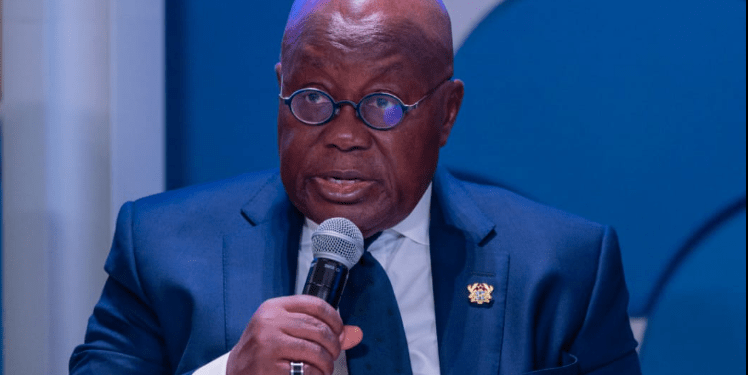President Nana Addo Dankwa Akufo-Addo has reiterated government’s commitment to invest continuously in the electricity transmission network.
This he said is to enable the country to evacuate more renewable energy through the national grid to support the extension of electricity to all parts of the country.
“It is our intention to attain full electricity access by the end of this year, up from the current rate of eighty-eight-point-eight percent (88.8%),” he said on Wednesday, 24th April 2024, in a ceremony held in Kaleo, officially inaugurated phase two of the Kaleo Solar Power Plant.
He added “I expect that, with this project in this community, corporate social responsibility programmes for Kaleo and its environment will be enhanced through the provision of social amenities by the appropriate authorities, including VRA.”
President Akufo-Addo expressed optimism about Ghana’s energy future, emphasizing the importance of collaboration and collective action in achieving sustainable development goals. He urged all stakeholders to uphold effective maintenance management practices to ensure the longevity and efficiency of renewable energy infrastructure, reaffirming his government’s dedication to building a brighter, greener future for all Ghanaians.
“By investing in renewable energy infrastructure, we are securing a reliable source of electricity and creating new opportunities for economic growth and job creation. This plant will not only power homes and businesses, but also serve as a catalyst for development in the Upper West Region, attracting investment and spurring innovation,” he added.
The President told the gathering that Government is implementing a series of policies and measures to incentivise green investments, foster a culture of energy efficiency, and prioritise the development of solar, wind, and hydroelectric power projects as key strategies for the growth of the energy sector in the country.
“The vision, however, is not only to be energy self-sufficient, but also to set the stage for Ghana to emerge as an eco-friendly country in the Region, inspiring neighbouring countries to follow suit in their pursuit of a greener, more energy-technology-centred future,” he added.
Recently, his Minister of Finance Dr Mohammed Amin Adam also said during a panel discussion on the sidelines of the Spring Meetings of the World Bank and IMF in Washington DC that Ghana has so far achieved 88.85 percent of electricity coverage.
Dr Amin Adam said the government is determined to achieve the 90 percent threshold by the end of the year.
“You have to be deliberate about energy access and so right from the early 1990s, we were very intentional, the government decided that Ghana must achieve universal access to electricity and so we put in the relevant policies, the national electrification scheme, rural electrification programme and the self-help electrification programme through which communities and the government share the cost of electricity access and so to them, it has paid off, we have achieved over 88.85% access.
The rest that we have not extended electricity to are usually ungrid communities, and island communities and we are trying to achieve that through mini-grids and other smaller systems that will extend electricity to all of them so we can achieve universal access.. By the standard of the industry, universal access is about 90 percent and we are determined to achieve this by end of this year.
“What you should not do is that in the past we procured energy through unsolicited projects, now we see that the costs are coming down and therefore we can acquire more capacity at lower cost through competitive procurement and therefore for renewables for example, we have moved to competitive prceurem so we can lower cost
“So we should avoid the practice of procuring energy through unsolicited projects because that turns to be very expensive. It is also important that when you are in crisis you do not acquire as many generation capacities as you will not need because the tendency for investors to come knocking on your door, justifying why you should acquire more because you have a crisis is very high and at the end of it you acquire capacity at very high-cost which you will have to contend with for the rest of the life span of those contracts.
“Let’s avoid this and also let us be intentional and plan for the long term on how we procure capacity but also how we build the infrastructure for the transmission to ensure that every part of the country gets access to electricity,” he said.


